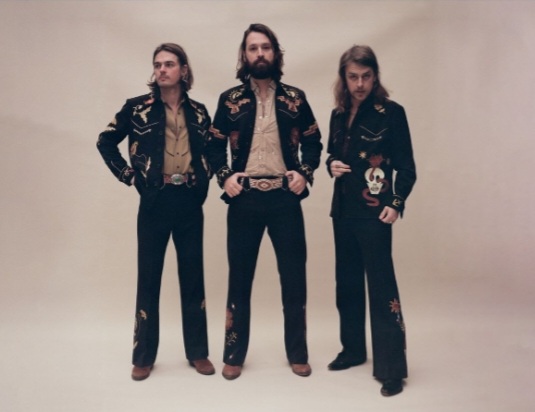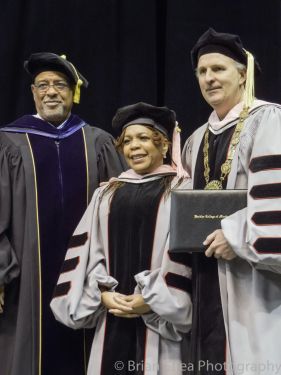The Netherlands have solidly been, in the last half a century, one of those few European nations that has heavily contributed to chisel new and exciting artists, as the years went by, with a deep understanding and appreciation of music, no matter the genre.
One particular name comes to mind, when you think about genuinely raw, pure and real talent, coming from the aforementioned part of the world and it is that of the explosive Rock & Soul trio called DeWolff.
The band is not new at all to the music scene; after their eponymous 2008's EP debut, DeWolff has been working hard and incessantly on perfecting their highly exciting and original hybrid of Southern Rock, Soul, R&B and 70's Psychedelia, a formula that, year after year, has met the general consensus of the music press and fans worldwide.
After releasing 5 albums in the last 4 years, brothers Pablo (Guitar/Vocals) and Luka Van De Poel (Drums/Vocals) alongside Robin Piso (Hammond/Wurlitzer), have stormed the charts of half the world with their new and incredibly inspired album called Love, Death & In-Between, recently reviewed by our website too.
To discuss DeWolff's unstoppable rising in the music business, focusing especially on the incredible success of the band's new album, Bluebird Reviews had the privilege to talk to Robin Piso about this extraordinary music machine that DeWolff truly is.
BR - Robin, welcome on Bluebird Reviews and many congratulations to you and the band for nailing, in our opinion, one of the best records of the decade, through your new record Love, Death & In-Between. To start our conversation, we were wondering how pleased and proud are you, for such an astounding body of work like your new album proved to be.
RP - Wow, thank you so much for your kind words, that is the very first time that our new album has been defined by the press in the way you guys did. Personally, this record gives me a feeling that no other previous records we have done in the past has given to me. I guess that the reason is that it really shows us as a band, where we are now and maybe that is the reason why I like to think that every new album we do, it is the best that we have ever done (smiles). Recording Love, Death & In-Between felt a little like painting, with us applying, like a musical painter would do, for each individual song, a little bass guitar, some backing vocals here and there, you know, things like that. In comparison to what we did on our previous studio album WolffPack (2021), on our new record we surrounded ourselves with many friends musicians in Brittany, France, where we stayed for two weeks with and record all the songs in a original, full-take style, without any overdubs. Recording in this way, it makes everything more emotional, because there were physically a lot of people with us, in the same place, playing and singing. You can understand that, where there are many people sharing with you those moments of raw emotions, it makes you feel, as a musician, that you have accomplished something really special, as I feel we did, on Love, Death & In-Between. It felt, overall, like a proper celebration of music and also a celebration of human connection on many levels, something I felt we really needed, especially after having recorded the previous album in a time of the world where pandemic was dictating distance among people. I must admit that I am also pleasantly surprised, by the way, about how much our new record reached to the heart of our fans and how much they connected with us and our music even more that it ever happened before, something that, in a time of the world like this, where music is all about creating layers, the human connection was an even more important factor at the core of the popularity of our new album.
BR - Do you feel that choosing to record on analogue make a profound impact in the way you record albums, including your new one, a little like you did already on previous records like Tascam Tapes and WolffPack?
RP - Yeah, definitely. For us, the reasons why we like to record on analogue are many. First of all, recording on tape sounds so much better, let me tell you this. It's just as easy as recording digitally, where you may do a lot of tricks , using a lot of different plug-ins and then, eventually, maybe you can get very close to come up with a nice musical soundscape. But if you have a tape recorder and you record something straight to it, to me, it already sounds awesome as it is and that is kind of cool; you get a glued sound, 'cause all of the tracks on the tape get a little bit of overlap in the tape heads. Also, there is a creative reason on why we like to record analogue, besides how easy it is to record on tape and it's related to the fact that it's not very easy to erase a mistake, trying to replace a specific note or, like, get the drums on a straight line, things like that. You have therefore to really listen to the take that you played and, if you don't like it, you have to do it again and again. But if you do like it and maybe there's a little mistake somewhere, the mistake at that point doesn't even matter anymore. To us, that's what ultimately would make the final take that we would choose, because it sounds more human than anything else. All the records that I like to listen to, most of them are also recorded on tape and I enjoy the fact that they also have some small human errors, something that make them sound so pure and beautiful. I don't like perfect stuff. It's boring. On top of everything, because recording on tape doesn't allow you to make mistakes and then fix them, then you have to prepare better, before a recording, like, you have to make choices, like "I am going to do this, on the recording and maybe fail or, perhaps if I am going to practise some more, maybe I can nail the take straight away" kind of thought process. Because you know, some bands, they just can't record to tape, because they aren't in sync enough or, perhaps, their music needs to be really straight, a bit like a machine.
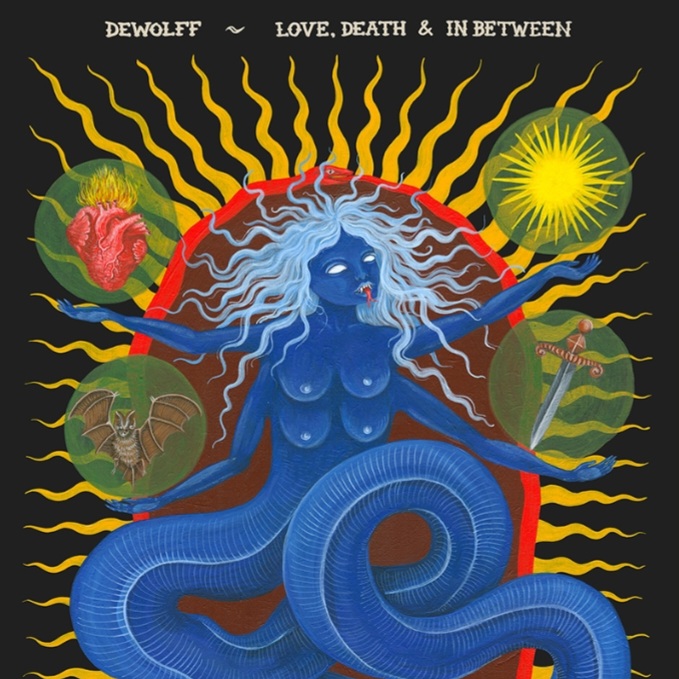
BR - Do you reckon that maintaining the purity of sound, for a band like DeWolff, together with guaranteeing an authentic, raw sounding vibe to the record, it also push you guys to try and reach an even more pitch perfect playing level, as a collective on each album, in order to deliver really what you're aiming to reach on a record?
RP - I guess, but also you need to have a certain performing level, to be able to play directly to tape. It's great to us, because it forces you to make mistakes and to embrace them at the same time. It makes you listen to the bigger picture of the song, which, for me, it is not about the notes you play, but it's about the energy and the vibe that the song gives you. Plus, you know, when you listen back to a take on tape, you know that it's done, you have nothing to look at and fix or nowhere to hide. Like, if you record on a computer, everyone listening back to it, they look at the screen and you see the wave forms and you get distracted, because you're not listening to the energy and the music anymore or the vibe. You're listening instead to the specific notes, all things that, to us, really don't matter.
BR - Robin, our website, among all the splendid arrangements of each and every song on the album, loved the idea of combining the sound of the Stax soul of the 60s with 70's Psychedelia and Southern Rock. How long did it take, in total, to write and record the whole of Love, Death & In-Between?
RP - I actually know the precise number, because we counted the exact amount of time that it took; it took16 days to write and 14 days to record and mix, therefore, a month exactly. It was crazy, because it went so fast. In the beginning of 2022, in January, we started to put down some writing sessions on our agendas and, usually, when we get together to write, some stuff comes out, which is really nice. I do love this, about DeWolff, the fact that when we are together, it doesn't take very long for inspiration to come together among us and I feel really blessed for that. But it's also, at the same time, hard work, you know, because you can't expect that the writing flow comes in a flash. But we always manage to be very productive, in that respect. So, this is what we did, when we started writing the album. At that point, we already knew how we wanted to record the album too, with a lot of different people together and that's how we knew that the songs and the vibe and the energy of the songs were going to be more defined by the people in studio with us, rather than being more defined by the notes and the chords. That's why the songs were kept pretty simple, like, not playing a lot of different chords, not playing different kind of rhythms or strange melodies. We just thought "OK, this sounds good already with just the three of us playing, imagine this with some cool Horn lines or like with a groovy base" and we knew that a song was finished, most certainly giving us a great feeling to listen to. We just then followed the same process with the next song and the next one and so on. That is the reason why, as I told you before, it felt like everything happened so fast. We just had the feeling that everything would have worked just as we thought. At one point, Pablo went on vacation in the USA with his wife and he visited the church of the great Al Green. When he came back, he told us what he witnessed there, which was an incredible amount of energy. It was not about the notes that were played in the church, the melodies or the chords. It was all about the way they played, not what you play and for me, that was kind of the starting point in the making of Love, Death & In-Between.
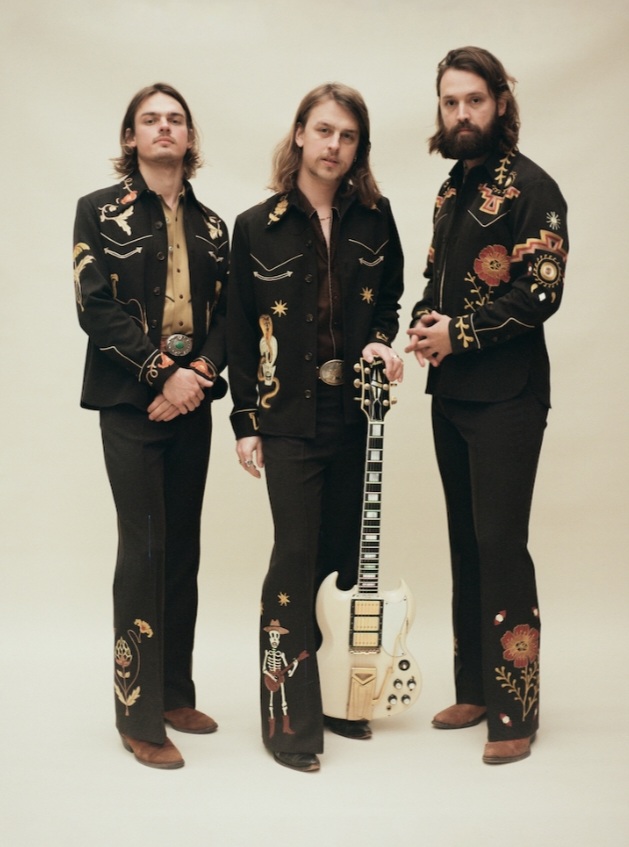
DeWolff - From L to R: Luka Van De Poel (Drums &Vocals), Pablo Van De Poel (Guitars & Vocals), Robin Piso (Hammond & Wurlitzer).
Photo courtesy of Satellite June
BR - You mentioned before that improvisation is a very big part of the way in which the band works, when it comes to recording new album and you made the point also that most of the energy in the room where you were recording, it was also dictated by the people that was with the band, at that time in studio. When DeWolff enter a studio to record new songs, has the band got already in mind how a song should exactly sound like, on the finished product or do you have, occasionally, last minute ideas that you are willing to try in studio, whilst recording and go slightly off tangent?
RP - The stuff that we write and the music that we make, they are always a sort of natural extension of our musical tastes represented in what we play. I remember the first jam session that we had, as a band, something like 16 years ago, where the brothers were telling me like "Yeah, do you wanna come and hang out to our place, where we can make music together. Our neighbours won't complain and maybe we can start a band...". We thought we were gonna be a Surf type of band, because we were really into stuff like Pulp Fiction the movie, you know, that kind of vibe. As we started playing, we realized that we weren't gonna be a Surf band at all and that was also the moment when we understood that it's so much better not to think of a genre that you want to be labelled with, but to let instead the music flow through you naturally. That is the way that we normally work, when we write and record new songs. But we do have, at the same time, also ideas about the directions that we want to take, when we write. Like, for example, we found out that Santana had this really cool live album with Buddy Miles, (Carlos Santana & Buddy Miles! Live!, released in 1972) which had a lot of high energy, like strong Horns Sections running through and like, a Big Band percussion sound and I thought "Wow, this is really an amazing sound". We wanted to write a song that had this kind of energy and vibe that could be sounding like a jam song. So we wrote it, with just the three of us and I think that also the bass player was there, when that happened. We just jammed, we pressed the record button and then, when we listened back, we thought, "Yeah this is nice, let's keep this energy and add some horns and some solos". Usually, at one point, when we jam, there might be a guitar solo or more than one solo in a sort of consecutive running, but we soon realized that, when we were jamming, we were soloing together and we kept on thinking that this was coming out way cool and so chaotically beautiful; then we look at each other and thought "f**k it, let's do it!" We were also not dubbing the solos separately, we were recording the song as it happened, with Pablo and I going absolutely crazy and feeding off each other's energy and that's what creates this really cool, enormous energy between us. In this respect, we did indeed choose to make a certain kind of song, but we never thought things like "OK, let's make a Soul song now or let's make it this kind of other song now". Another example, for this album's songs, is when I also had the Wurlitzer Piano, in the studio and some songs came out of that, like, I was sitting at the Wurlitzer and playing some chords and lines, improvising and Pablo thought that what he was hearing was kind of cool; then, almost instantly, those feelings got translated into a Soul vibe, say a little like in a Ray Charles sort of style. As a consequence, those vibes immediately drove us to do some vocal harmonies that had a more soulful feeling about them and by doing that, another musical idea was born. This is the way in which we like to work, when we write new songs and I hope that this answered your question.
BR - The band has been together for 16 years and we were wondering how, in your personal opinion, does this new album reflect the musical and emotional growth of the band in its entirety?
RP - As I was telling you before, I always feel like a new album is always the best, also because the last album, to me, is always the most complete. Except maybe for the Tascam Tapes album (2020), because that was more like a concept album. The concept was about the fact that the album was made whilst we were On The Road; there was no Hammond organ in there, there weren't even real drums in there, so that was not really representative of DeWolff as a band in its entirety. I felt more that WolffPack was the album that better displayed the accumulation of our growth and experience in our musical journey so far. If I think about a song like Rosita, from our new album, I mean, there's a lot of stuff in there about us and what we love playing. There are some Psychedelia, there is some Southern Rock, there's some Soul, all aspects of our music which I didn't think were truly represented in our previous albums.
BR - You just mentioned the song Rosita, one of the many masterpieces included in the Love, Death & In-Between album. That must have been a particularly challenging song for you and the band to nail, given its 16 minutes-plus duration.
RP - I think, if I am not mistaken, that for a lot of songs of the new album, we usually took about three takes, although we often end up choosing the first one. The way we work, it is that we would record the first take, then we would think that it was a pretty good one but we 'd maybe like to try it again another couple of times, before taking our final decision on which one sounds the best. We wouldn't care, when choosing a take, whether the piano was playing a wrong note or the horns run out of line. We would just say to ourselves "f**k it, let's go with it", because it really felt, despite the little errors here and there, the most organic and full enough of vibes type of take we wanted to achieve. I don't think we ever recorded just one take in any of our records, because we always think that we could do one better than the previous one, although that may some times work, some other not.
BR - You mentioned before the experience that Pablo had when he was in America on vacation and visited Al Green's church. In that respect, we don't think that, on Love, Death & In-Between there is a better song on the album than Night Train able to represent that spirituality that Pablo might have felt, while visiting Green's church. Do you feel that, somehow, the spirituality that emerged from that song has, perhaps unconsciously, influenced the way that DeWolff worked on your current album?
RP - Personally, I think I would rather call it energy, or human energy, more specifically. I guess that you and I mean the same, though. The starting point for us, when we started working on Night Train, it was to try and imagine ourselves as an audience going to a DeWolff show, wondering what we would like to witness, on stage, as the most insanely, infectious starting song in a DeWolff show that we could ever dream of. Also, we tried to imagine how to match, lyrically, the intensity of the sound of the opening song and take the crowd on a journey with us. As a band, since our early days, we've always kind of felt like misfits, in this world, because, you know, of course, being musicians and the way we dress, in a kind of weird way, according to some, it has always been something that people looked at, like when we were walking in the streets or playing live. So, through Night Train, we wanted to invite our audiences to join us in our journey, on a train where you don't have to feel awkward, whichever way you dress or look like. We wanted them to forget everything negative going on in their lives and, like, just to be there and feel free, no matter whether you feel that you're born to domination or touched by grace. That emotional liberation that comes from the lyrics and the music, to me it is what creates an energy, like maybe some kind of spirituality that is really special and I hope that people truly feel that, when they come to one of our shows. Like Rosita, again, when we recorded that, for me it was like a goosebump moment and after we did, like, the 3rd take of that song, we knew that was the one. About 5 minutes after the song was finished, I remember I started crying, 'cause I knew how special it was that moment and what we were doing in that moment. It was such a special feeling and I felt really grateful, about being able to feel such an energy, through that special song, in my life. To be able to share that energy with people, either within the band or on stage with a crowd, it just gives you an enormous feeling of love. We asked all our friends musicians that were working with us on Love, Death & In-Between, people that have been part of the DeWolff big family for a long time now, to be part of the making of Rosita and everyone would go "F**k yeah, that is so cool, let's do this special thing!". Rosita was also really hard to rehearse, you know and to get it on tape too, 'cause it's such an emotional roller coaster recording it. It would start really smoothly and then, when you find yourself in the middle of this kind of suite, you start thinking "God, this starts feeling amazing!". When then you get close to the end of the song, you feel so tense, in a positive way, by thinking, "Oh s**t, I don't want to f**k this up", because this is THE take, the one that everyone's really feeling. Everybody's on the edge, looking at each other and when you then reach the final chords, then comes this sense of emotional release of this fabulously intense roller coaster ride. So maybe yeah, there must have been surely something spiritual going around, you might be right (smiles).
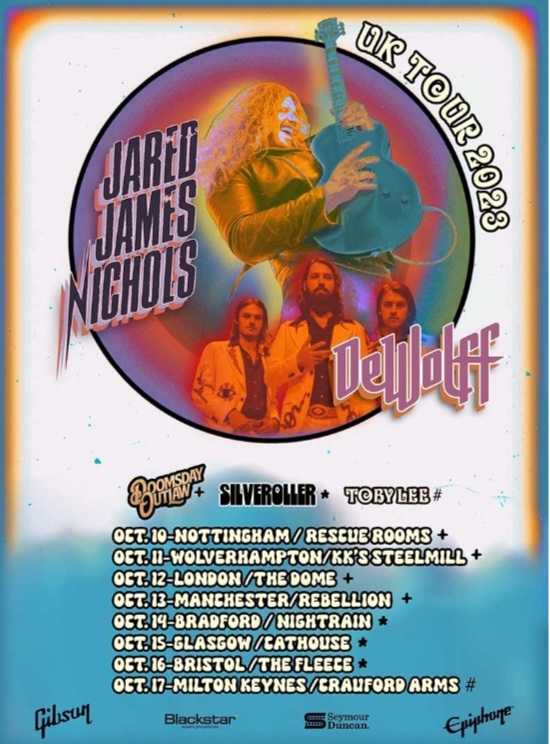
BR - Let's talk about touring, now, Robin. The news are in that DeWolff are going to Tour the United Kingdom and Europe, with the United States hopefully on the horizon very soon. How excited is the band, right now, in taking Love, Death & In-Between live on Tour around Europe and the United Kingdom?
RP - Very excited. We will be doing a double bill with the American guitarist and singer/songwriter Jared James Nicholls, starting from October 2023 across the UK and Europe, as you just said. At the moment, we don't know yet when we are going to tour the States, but we will hopefully do so soon. Very excited to this forthcoming Tour, with an added bonus that made me really smile, about a Tour date in the UK, in Bradford, where we will be playing in a club called Night Train! That is not a bit coincidental at all with our album's track-list, right? (smiles). We cannot wait to be there for the start of the European Tour.
BR - Our website cannot stop playing your record and each song included in your album feels like a warm, sonic caress, no matter what genre you guys play every time you are on stage. Before parting company with you, Robin, what do you think it is, in your opinion, that kind of special recipe, that irresistible key factor about DeWolff's music approach that keeps on attracting fans from all around the world to your music?
RP - I think that it is all about being open minded about any type of music genre we want to play. We just write what is and feels like a natural extension of ourselves, our way of feeling music and what music we like to play. The fact that we also keep an open mind for new inspirations and not wanting to be necessarily labelled to any style of music or any specific genre, that may be something that our fans may respect to. We like to believe that, as long as music is coming from the purest point of one's heart, there will be always someone out there that will feel the same way we feel, when we make music. If you do what you truly love, then somebody's gonna like it for sure and that's what we will keep on doing for the rest of our lives.

